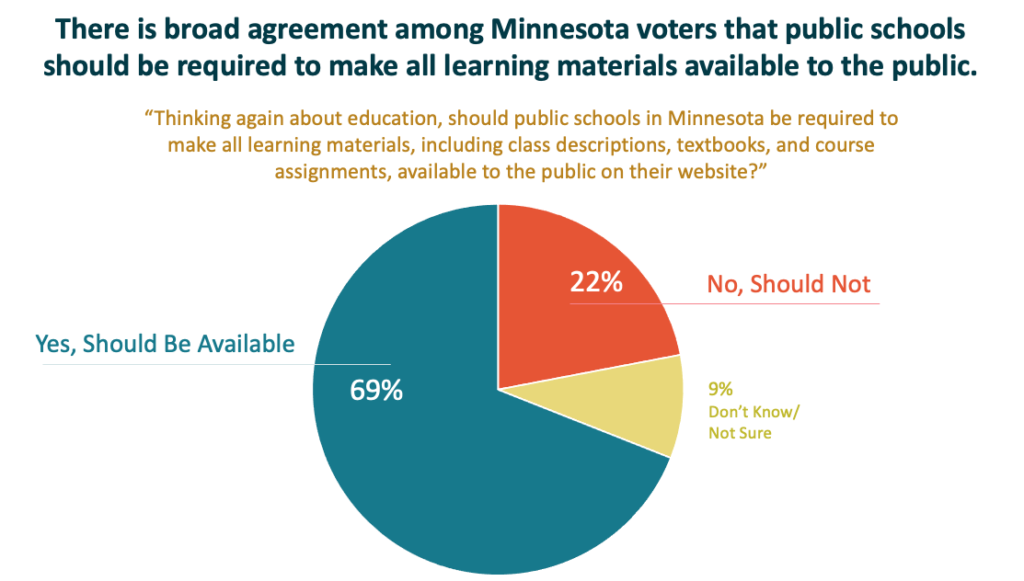Parents Bill of Rights leads education agenda
American Experiment will pursue an aggressive education agenda in the 2022 legislative session. A primary goal will be enhanced academic and financial transparency to arm parents with the information they need to hold the education bureaucracy accountable. We will join the national push for a Parents Bill of Rights that restores power to parents in the education of their children.
Transparency
Legislation requiring school districts to make all teaching and learning materials available to the public on the district’s website should be a priority. This should include teacher training, expenditures, and school policies and procedures. This transparency measure has the support of 69 percent of Minnesotans in the latest Thinking Minnesota poll.

A bill authored by Sen. Justin Eichorn (R-Grand Rapids) will be heard in the Senate Education Committee this week to require school districts to post learning materials on their website, bringing much-needed transparency to Minnesota schools.
Combating radical narratives
Classroom use of intellectual components of Critical Race Theory, such as discrimination on the basis of race, sex or other group identities; the teaching of bigoted race and sex stereotyping; and the requirement that students or teachers affirm concepts like systemic racism and gender fluidity should be prohibited.
Promoting school choice and legislative oversight
School choice initiatives should be prioritized in the upcoming legislative session. Any revisions or reforms of the K-12 academic standards should be submitted to the legislature for approval or rejection. The proposed Page Amendment, as well as the use of civics education as training for social justice activism, are tools that do nothing to improve Minnesota’s schools and should not be implemented.
School Board Elections
Finally, aligning school board election dates with the general election in November will strengthen reform efforts by weakening the teachers’ union’s influence in low-turnout municipal elections.
Political leaders annually wring their hands looking for solutions to solve Minnesota’s nation-leading achievement gap. Education reform groups come and go, all with well-meaning mission statements. For example, Education Next was formed in 2012 with a star-studded cast of major foundations, city and county leaders, and education experts to “harness the community’s knowledge, expertise, and action to ensure that every child can thrive.” In almost 10 years, they’ve done nothing to close the achievement gap.
What about more money? Things will surely get better when we “fully fund education,” as the teachers’ union proposes. The per-student formula in Minnesota increased from $4,601 in 2002-2003 to $6,832 in 2022. That increase does not even include the additions for poverty, language, sparsity and 25 other “categoricals” that bring per-student funding to over $16,000 for districts like Minneapolis. Money is clearly not the problem.
The Teacher Union Governor
More than anything, Gov. Tim Walz is a union teacher. It’s no surprise then, that he is proposing a 2% increase on the per-student funding formula for each of the next two years. That money will go directly to union teachers in the form of salary increases. Faced with the largest achievement gap in the country and two years of students falling behind because of his school closures, Gov. Walz and his crack education team decided more money on the funding formula would be their top priority for education. Brilliant.
The alleged Feeding Our Future Scandal
The alleged scandal involving the St. Anthony-based nonprofit Feeding Our Future continues to reverberate around the Capitol. The scandal involves $48 million in, as of yet, unaccounted dollars from a government program to feed low-income children. The state Education Department oversees the program in Minnesota.
Last week, four Republican state senators called for an official audit of the Department’s role in the alleged scandal. In addition, a just-announced Republican candidate for state auditor mentioned the scandal as one reason he decided to jump into the race.
Dumbing down college admissions is this week’s dumb bill idea
Several Democrats in the Minnesota House introduced a bill (HF 3034) telling Minnesota colleges they can’t use ACT or SAT test scores for admissions or to award loans, grants, scholarships, or other forms of need-based or merit-based financial benefits.
This bill represents another volley in the war against excellence in Minnesota education. Democrats have already weakened graduation requirements and dismantled the school accountability system in Minnesota, leaving national standardized tests as the only way to evaluate prospective students.
What would this do to the prestige of Minnesota colleges? Why would parents from another state send their high-performing kids here? And what high-performing Minnesota student will want to attend a Minnesota college? This legislation would be a disaster, all in the name of “equity.” Read more from our education policy fellow Catrin Wigfall here.
Good bill brings us sunshine in learning
Sen. Justin Eichorn (R-Grand Rapids) introduced SF 2909 as part of his Parents Bill of Rights legislation to bring transparency to what’s being taught in Minnesota schools. The premise is simple: put all your learning materials on the website so parents can see what’s being taught to children.
Quote of the Week
“We appreciate the department’s recognition of the importance of a well-rounded education by encouraging access and opportunity to lessons outside tested subject areas.”
Denise Specht
Education Minnesota President
Teacher union president Denise Specht offered her support for a Walz administration initiative to encourage schools to spend less time on math and reading. You read that right. Gov. Tim Walz wants Minnesota students to spend less time on math and reading so they can have a more “well-rounded” education.
Schools will be asked to “calculate the share of time spent outside of tested subject areas to promote a well-rounded education experience.” There has never been a stronger case for real school choice.
To see this content first, subscribe to our weekly Capitol Watch email below.
Subscribe to Capitol Watch
Minnesota political news from an insider’s perspective.